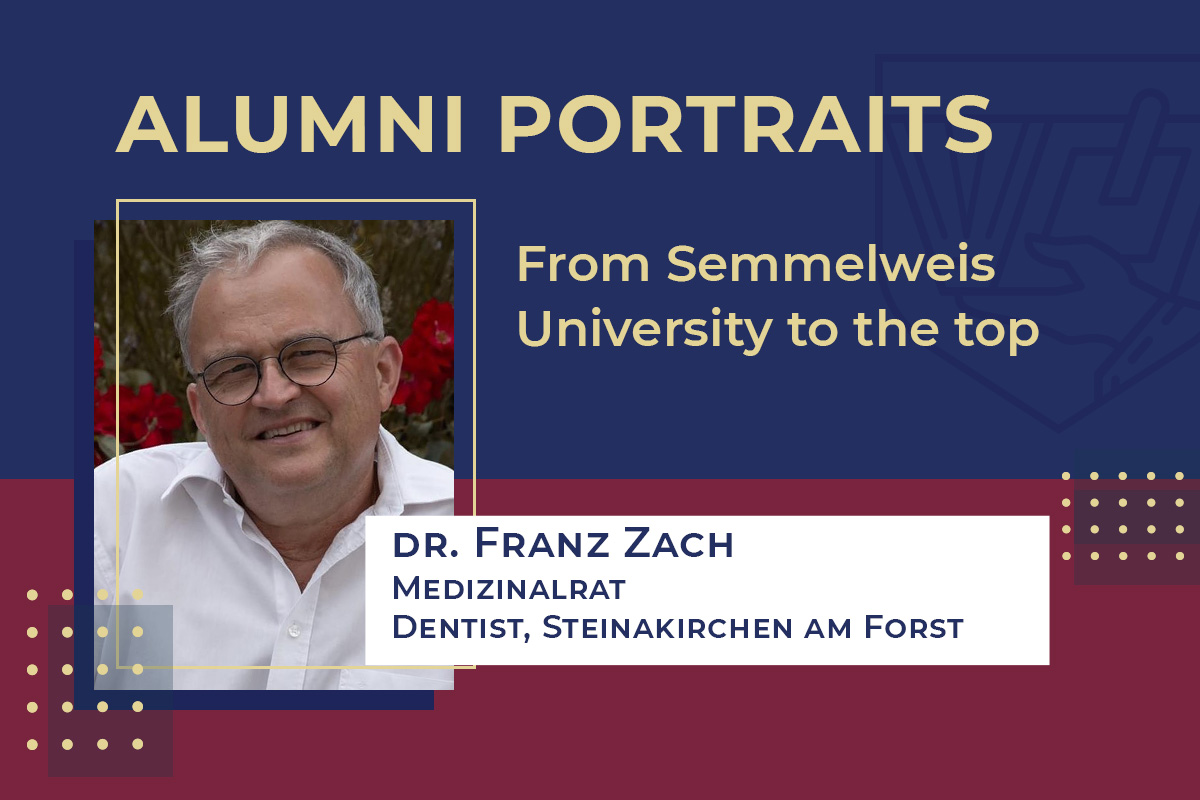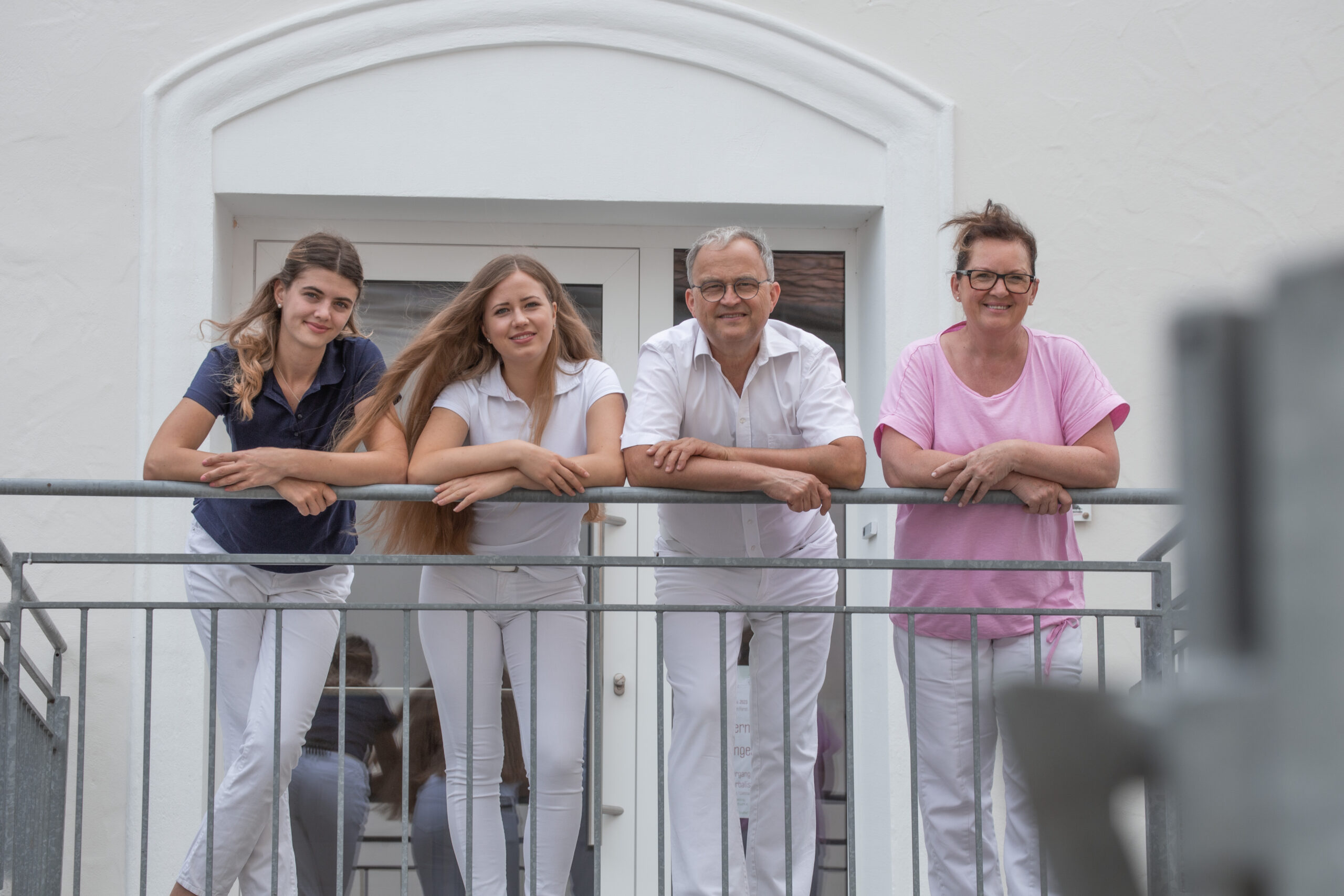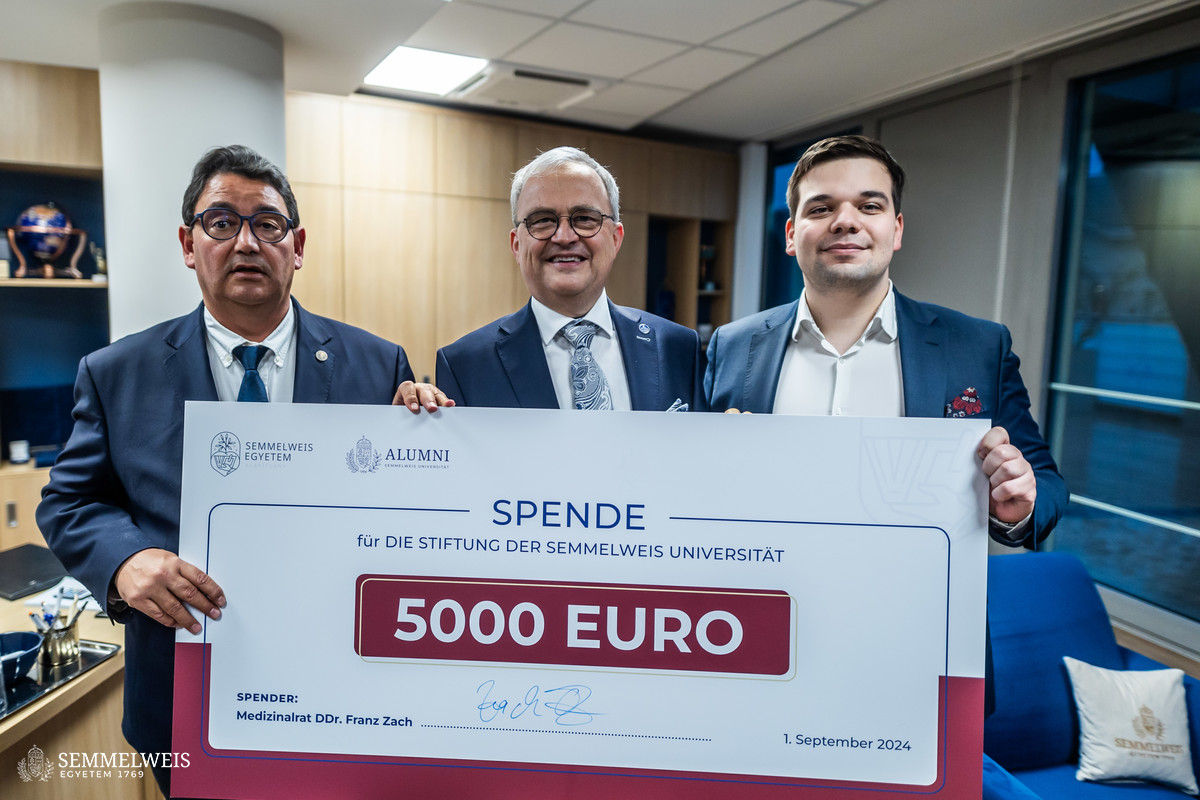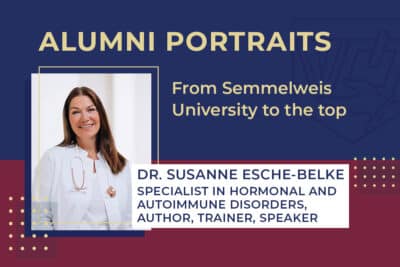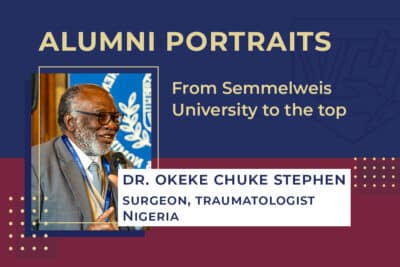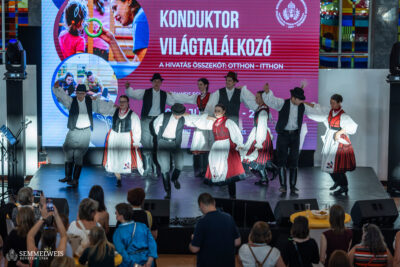Why did you choose Semmelweis University?
There were several reasons behind my decision. At that time, access to medical universities was free in Austria, and in Graz 650 young people started studying medicine every year. Students were unpopular subjects and there were no opportunities for interaction with the teaching staff. This became too much for me in the middle of my studies, I couldn’t get all the accumulated questions answered anywhere, so I interrupted my studies without ever getting a negative grade.
As I was on the lookout for medical universities abroad, I came across Semmelweis University‘s German-language education. I applied immediately and was admitted to medicine. Nevertheless, I dared to change my plan to dental medicine, as the old system of studying human medicine preceding specialist training still applied to dentistry in Austria at the time. It was foreseeable that Austria would change this due to the harmonization of EU law, nevertheless, it was risky. In the first two years of my dental career in Vienna, I was only allowed to work with an individual license and in a hospital.
At Semmelweis, there were 12 students in my group, whereas in Graz there were more than 650. Budapest was heaven on earth for my tormented soul.
How did the years at Semmelweis influence your later studies?
In the beginning, the new country, a completely different and initially foreign language, a different culture, and everything new made things very difficult for many students. They had to work out and explore how Budapest and this new university worked. Therefore, the supervisors at the German-language student secretariat had to go above and beyond their job descriptions. Our angels, Ms. Fonyó, Ms. Rokosz, and Ms. Varga always listened to us and helped us in a kind and loving way. They deserve our everlasting thanks.
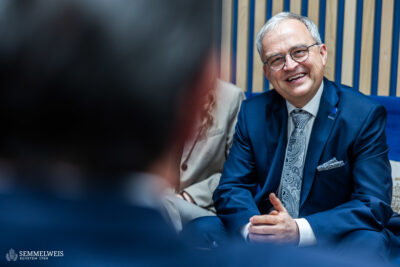 The faculty always treated us with great respect. This was the case in every clinic and theoretical department at the Nagyvárad Square Theoretical Block (NET), students were accepted and maximum interaction was possible. In my opinion, this is the most important aspect of the whole program. If you can ask a question, you can understand and thus complete your studies. The way the doctors treated the patients was also always impressive. The doctor-patient relationship in my host country seemed to be very different from what I was used to in my home country. This lived humanitas, in the ancient Latin sense of the word, meaning “the human being and the norms and behaviors that make up the human being,” was formative and so inspiring for me that I carried this on in my life.
The faculty always treated us with great respect. This was the case in every clinic and theoretical department at the Nagyvárad Square Theoretical Block (NET), students were accepted and maximum interaction was possible. In my opinion, this is the most important aspect of the whole program. If you can ask a question, you can understand and thus complete your studies. The way the doctors treated the patients was also always impressive. The doctor-patient relationship in my host country seemed to be very different from what I was used to in my home country. This lived humanitas, in the ancient Latin sense of the word, meaning “the human being and the norms and behaviors that make up the human being,” was formative and so inspiring for me that I carried this on in my life.
What inspired you to specialize in dentistry, and why did you decide to establish your practice in Steinakirchen am Forst, Austria?
Dentistry would probably never have been an issue for me until I was on the other side, i.e. the practitioner’s side, for the first time. During the summer months, I took my aunt to a fellow student who was already a dentist, and I was allowed to stand on the dentist’s side during the appointment. And suddenly I was hooked on this profession.
Back then, the dental practice positions were hopelessly full in Austria, while Lower Austria was the only federal state offering four vacancies. I knew Steinakirchen am Forst, as I attended secondary school there from 1977 to 1982, far away from my home in southern Styria.
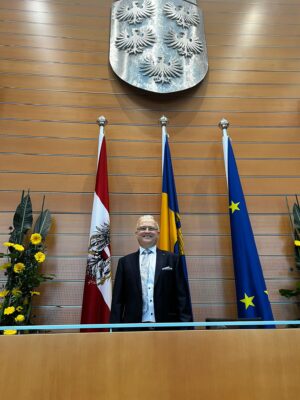 In December 2023, you were awarded the title of “Medizinalrat.” What does this title mean to you, and how does it impact your daily work?
In December 2023, you were awarded the title of “Medizinalrat.” What does this title mean to you, and how does it impact your daily work?
I bow my head in humility. For me and the generation after me, this will be a milestone in family history.
I was awarded the professional title of Medizinalrat by decree of our Federal President. The prerequisite for this honor is that only outstanding representatives of the medical profession may be entrusted with it and that they have rendered outstanding services to the Republic of Austria over many years of practicing their profession.
This award is a very special honor for me, it has become my label, and it shows me that my many years of dental work and my social commitment have been particularly appreciated. It inspires me to continue on my path and to do so with great humility.
Your practice focuses on implantology and fixed dental prosthetics. What led you to these specialties, and how do you see these fields evolving in the future?
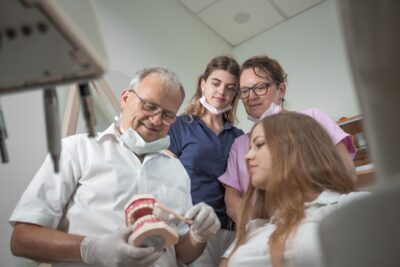 Over the last twenty years, dentistry has clearly developed in the direction of fixed dentures. It was increasingly recognized that grinding down healthy teeth to make a bridge was to be viewed critically. Therefore, the triumphant advance of implants continued, and all-on-4 solutions were introduced in edentulous jaws, representing a further stage in development and patient comfort. I am delighted to have had the opportunity to attend a course at the Malo Clinic in Lisbon.
Over the last twenty years, dentistry has clearly developed in the direction of fixed dentures. It was increasingly recognized that grinding down healthy teeth to make a bridge was to be viewed critically. Therefore, the triumphant advance of implants continued, and all-on-4 solutions were introduced in edentulous jaws, representing a further stage in development and patient comfort. I am delighted to have had the opportunity to attend a course at the Malo Clinic in Lisbon.
Nevertheless, the prognosis for implants seems to be increasingly influenced by the fact that the younger generation, starting from kindergarten, has been particularly instructed and motivated concerning oral hygiene. “Prophylaxis, prophylaxis, and more prophylaxis” is the motto for all patients today, so the demand for implants will level off and probably even decrease one day. That is my personal prediction.
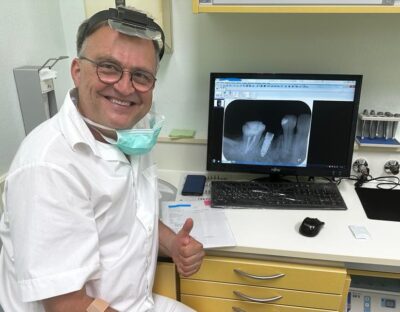 Your social media posts emphasize welcoming all patients regardless of their background or insurance status. Why is this approach important to you, and how does it impact your community?
Your social media posts emphasize welcoming all patients regardless of their background or insurance status. Why is this approach important to you, and how does it impact your community?
I deliberately chose my profession in the countryside to be a country dentist who treats a broad stratum, basically the entire population. For me, the Hippocratic Oath is not an empty phrase, humanitas should be an indispensable virtue of every doctor. In my 23 years working in Steinakirchen, I have treated over 12,500 patients, which is a sign for me and my practice that patients value us for who we are. Kant’s Categorical Imperative was, is, and will continue to be the guiding principle of my work.
What role do social media play in your practice, and how do they help you communicate with patients?
Social media have long played an important role for me in presenting my practice, as we can use them to disseminate targeted information to our followers, who represent all age groups.
What are your future plans for your practice and professional development?
My plans for the future at 62+ are manageable. The labor crisis has not stopped at dentistry either. My job is therefore to be there for the population a little longer and also to make sure that there is a successor. It would be nice if, in the future, online lists were kept at the universities where colleagues could register assistant dentists and successors to find newly graduated doctors. I would certainly be the first to sign up.
Do you have any advice for current students regarding effective learning, career, or how to find a balance between their academic and private lives?
This is a very difficult question to answer. Everyone deals with learning differently, some learn easily, others with difficulty. The only way to find your way here is through experience and getting to know yourself.
My advice, no matter what type of learner you are, would be to attend all lectures and practical classes and to seek the opportunity for maximum interaction with the lecturers, not to take any unanswered questions home with you. Also, leave plenty of room for discussion with the students. This saves a lot of time on unnecessary and tedious learning and research. Make maximum use of our teachers’ time.
I would recommend doing as many internships as possible in different countries and, if possible, building networks.
How would you describe what being a Semmelweis alumni member means to you?
Being a Semmelweis alumni fills me with great pride and gratitude. I, therefore, like to visit Budapest and the alumni events whenever possible and never miss an opportunity to reveal that I am a Semmelweis alumni.
What inspired you to support Semmelweis University? What message would you like to share with current students, and what does being a member of the university’s alumni community mean to you?
Self-reflection is intrinsic to human beings. This self-reflection is all the more important in the phase of life in which the professional finale is approaching.
I was only able to achieve what I did because of Semmelweis University. I recognized the role of my alma mater, Semmelweis University, and its importance in my life. I realized that without this diploma, my life would have taken a completely different path. My gratitude is therefore reflected in the donation, and I would like to call on all my colleagues to reflect from time to time on the role that Semmelweis University has played and continues to play in their lives. I therefore hope that my donation will be followed by others, for the benefit of our alma mater, Semmelweis University.
DDr. Franz Zach completed his studies in 1999 at the Faculty of Dentistry. On the occasion of the 25th anniversary of his graduation, he donated EUR 5000 to the Foundation for National Health Care and Medical Education, maintainer of Semmelweis University.
Dr. Zsuzsanna Fecser, Alumni Directorate
Photos by Franz Zach; Bálint Barta – Semmelweis University
